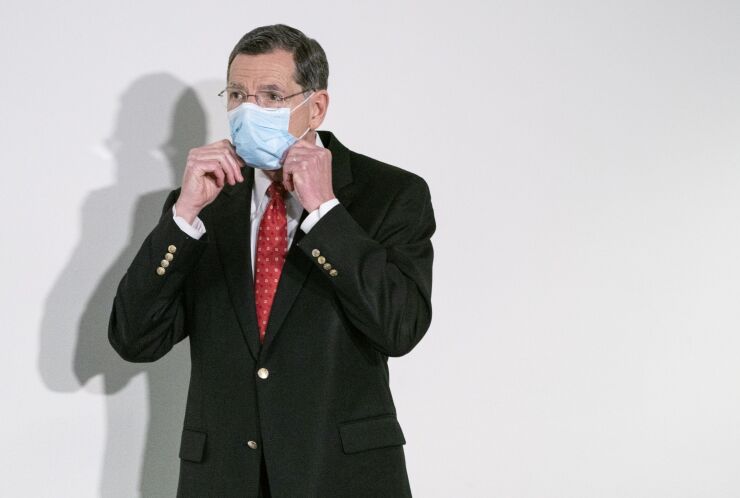Municipalities may eventually benefit from more funding for water infrastructure projects after robust legislation passed a Senate committee on Wednesday.
The Senate Committee on Environment and Public Works passed its bipartisan America’s Water Infrastructure Act of 2020 and Drinking Water Infrastructure Act of 2020 Wednesday morning, voting 21-0.
AWIA authorizes $17 billion in new federal spending to invest in water infrastructure as municipalities grapple with coronavirus’ impact on their water systems. It is essentially the Water Resources Development Act which is usually passed every two years — the last time being in 2018.

This comes almost a year after the committee passed The America’s Transportation Infrastructure Act, a five-year surface transportation authorizing $287 billion in funding from a depleted Highway Trust Fund and a 27% increase over the Fixing America’s Surface Transportation Act’s levels.
“Our highway infrastructure legislation, combined with these two water infrastructure bills, will answer the president’s call to help revive our nation’s economy once we have moved beyond the immediate health crisis,” said Sen. John Barrasso, R-Wyo., chairman of the EPW Committee, during Wednesday’s hearing.
AWIA includes reauthorization of the Clean Water State Revolving Loan Fund at increased levels for the first time in more than 30 years and increases assistance to struggling communities.
The CWSRF is currently set at $1.64 billion, but under AWIA would incrementally increase to $2 billion in fiscal year 2021, $2.5 billion in FY 2022 and $3 billion in FY 2023 for a total of $7.5 billion.
It would be the largest increase of the CWSRF since it was originally appropriated in 1987.
SRFs act as infrastructure banks by providing low interest loans for drinking water infrastructure projects. As money is paid back into the state’s revolving loan fund, the state makes new loans for other projects. These recycled repayments of loan principal and interest earnings allow the state’s fund to “revolve” over time.
The Environmental Protection Agency administers the broader revolving fund program, though states administer their own individual programs. States can use funds not only to provide loans but also to guarantee local debt, purchase bond insurance and refinance projects.
The approved bills also reauthorize the Water Infrastructure Finance and Innovation Act to finance “shovel ready” water infrastructure projects and streamline the WIFIA application process by requiring only one final rating opinion as opposed to two.
WIFIA provides low-cost loans and loan guarantees to eligible borrowers for water and wastewater projects. It is designed to work with bonds and other funding sources.
The Senate committee’s bill would reauthorize WIFIA at $50 million a year through 2024. Sens. Thomas Carper, D-Del., Shelley Moore, R-W.Va. and Benjamin Cardin, D-Del. are cosponsors on that bill.
The committee’s DWIA will provide an estimated $2.5 billion in federal authorizations.
That bill requires a state to use 20% of the Drinking Water State Revolving Loan Funds they receive to provide grants, no-interest loans, forgiveness of loan principal, or to buy, refinance or restructure debt.
Sens. Tammy Duckworth, D-Ill., Kevin Cramer, R-N.D. and Carper are cosponsors for DWIA.
The National Association of Clean Water Agencies supports the Senate committee’s proposed AWIA, but said they need to take into consideration the impact of COVID-19.
“This bill includes robust funding reauthorizations which are greatly appreciated by the sector,” said Adam Krantz, NACWA CEO. “However, much of this legislation was drafted prior to our current national public health crisis, and it is my hope that both houses of Congress will take into account the heightened need and appreciation for access to clean water in protecting public health and the environment in a pandemic. The funding levels in this bill should only serve as a starting point.”
NACWA also wants the committee to consider higher amounts for the revolving loan fund program over the next three years as municipalities deal with the fallout of COVID-19.
The House Committee on Transportation and Infrastructure introduced the Water Quality Protection and Job Creation Act of 2019 in October last year, which would authorize $20 billion over five years in wastewater infrastructure through the Clean Water State Revolving Fund.





